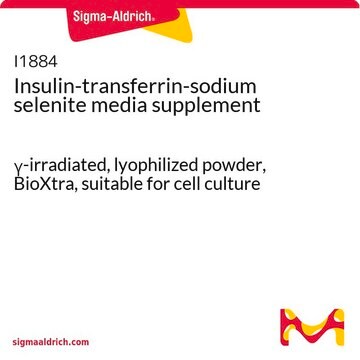N6530
N1 Medium Supplement (100×)
solution, sterile-filtered, suitable for cell culture
Sinónimos:
N1 Supplement
Iniciar sesiónpara Ver la Fijación de precios por contrato y de la organización
About This Item
UNSPSC Code:
12352207
NACRES:
NA.77
Productos recomendados
sterility
sterile-filtered
form
solution
technique(s)
cell culture | mammalian: suitable
impurities
endotoxin, tested
storage temp.
2-8°C
General description
N1 Medium Supplement (100×) can be used as a supplement to produce complete N1 neural cell growth media or closely related media.
Application
N1 Medium Supplement (100×) has been used as:
- a component of the proliferation medium for culturing oligodendrocyte-like cells and neuroblastoma cells
- a supplement in the Dulbecco′s modified Eagle medium (DMEM/F12) to culture human oligodendrocytes
- a component of the α-minimum essential medium (MEM) for culturing induced primary retinal pigment epithelium (ipRPE) monolayers
Other Notes
Contains 0.5mg/ml recombinant human insulin, 0.5mg/ml human transferrin (partially iron-saturated), 0.5μg/ml sodium selenite, 1.6mg/ml putrescine, and 0.73μg/ml progesterone.
Preparation Note
Prepared in Earle′s Balanced Salt Solution (EBSS) without phenol red.
related product
Referencia del producto
Descripción
Precios
Storage Class
12 - Non Combustible Liquids
wgk_germany
WGK 1
flash_point_f
Not applicable
flash_point_c
Not applicable
ppe
Eyeshields, Gloves, multi-purpose combination respirator cartridge (US)
Certificados de análisis (COA)
Busque Certificados de análisis (COA) introduciendo el número de lote del producto. Los números de lote se encuentran en la etiqueta del producto después de las palabras «Lot» o «Batch»
¿Ya tiene este producto?
Encuentre la documentación para los productos que ha comprado recientemente en la Biblioteca de documentos.
Los clientes también vieron
Lucia Lichvarova et al.
Scientific reports, 10(1), 12518-12518 (2020-07-23)
An amendment to this paper has been published and can be accessed via a link at the top of the paper.
Ludmila A Voloboueva et al.
Investigative ophthalmology & visual science, 46(11), 4302-4310 (2005-10-27)
To determine whether (R)-alpha-lipoic acid (LA) protects cultured human fetal retinal pigment epithelial (hfRPE) cells against oxidative injury and identify the pathways that may mediate protection. Cultured hfRPE cells were pretreated with various concentrations of LA for 14 to 16
Nicholas W Kieran et al.
Journal of neuroinflammation, 19(1), 10-10 (2022-01-08)
Astrocytes are the most numerous glial cell type with important roles in maintaining homeostasis and responding to diseases in the brain. Astrocyte function is subject to modulation by microRNAs (miRs), which are short nucleotide strands that regulate protein expression in
Miguel Flores-Bellver et al.
Journal of extracellular vesicles, 10(13), e12165-e12165 (2021-11-10)
Age-related macular degeneration (AMD) is a leading cause of blindness worldwide. Drusen are key contributors to the etiology of AMD and the ability to modulate drusen biogenesis could lead to therapeutic strategies to slow or halt AMD progression. The mechanisms
Michael Craigie et al.
Journal of neuroimmune pharmacology : the official journal of the Society on NeuroImmune Pharmacology, 13(2), 126-142 (2017-11-22)
JC virus (JCV) is a human polyomavirus and the etiologic agent of the demyelinating disease progressive multifocal leukoencephalopathy (PML). PML is observed in patients with underlying immunocompromising conditions, suggesting that neuro-immune interactions between peripheral immune cells and neuro-glia play an
Nuestro equipo de científicos tiene experiencia en todas las áreas de investigación: Ciencias de la vida, Ciencia de los materiales, Síntesis química, Cromatografía, Analítica y muchas otras.
Póngase en contacto con el Servicio técnico









